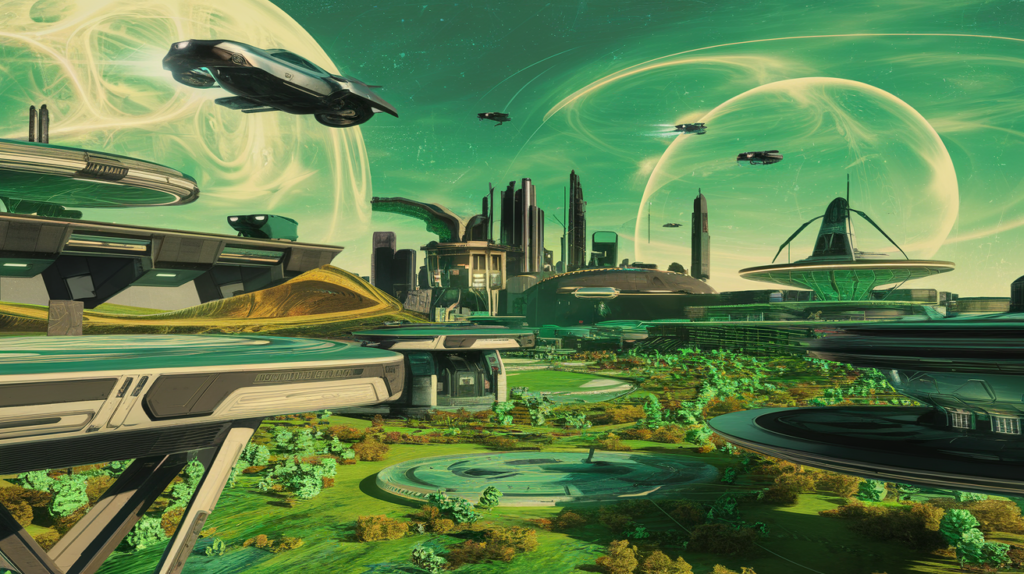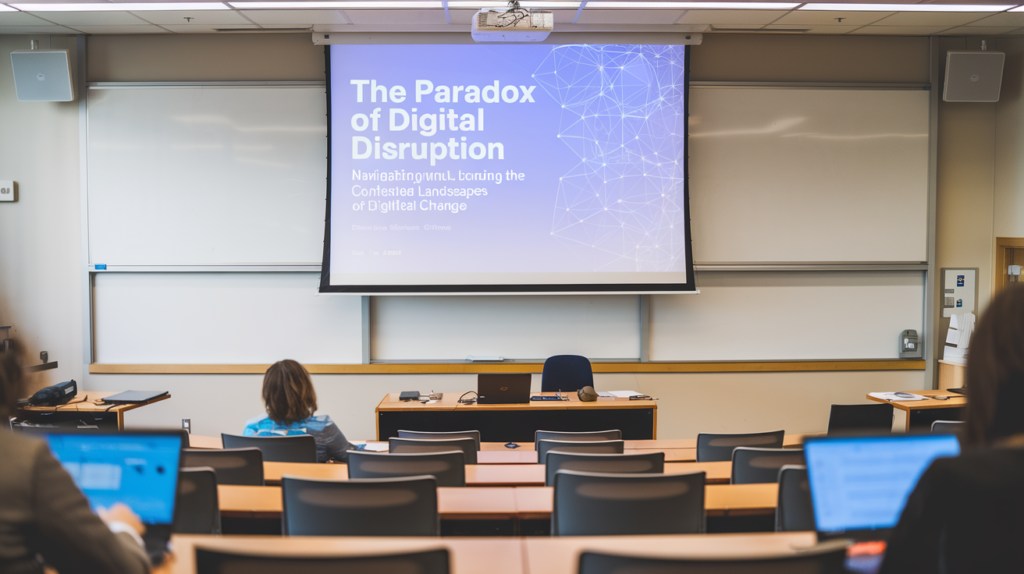Introduction
The force of technological innovation shapes the landscape of the present day in which industries and societies get reshaped. As rapid as the digital disruption becomes, it is far from being without its discontents. This advent of artificial intelligence, automation, and machine learning brings with it unprecedented efficiencies and convenience. But it spawns a maze of moral dilemmas, economic displacement, and existential fears. The irony is that those instruments that were to set human history in motion can make its trajectory more dangerous.
The Inevitable Rise of Artificial Intelligence
Artificial intelligence is the classic example of this two-edged sword. While the AI diagnostic capabilities are reshaping how medical procedures are conducted and while earlier interventions and more patient-focused treatments are now permitted with this technological marvel comes troubling questions of displacing the human expertise and its old medical professions. As machines began making decisions that are thought to belong solely in the minds of most trained professionals, society was left with a very crucial question: would AI add or replace human ingenuity?
Automation and Labor Supremacy
With AI, automation is revolutionizing the industrial landscape at speeds previously unimaginable. Now the manufacturing sector, which was so synonymous with human labor, was increasingly coming to be dotted with the presence of robots and automatic systems. Sure, they promised greater efficiency and even lower operational costs, but they also portended huge job losses, and among those now poised to lose were the workers that once toiled productively at the assembly line. Whether society will offer retraining programs or support mechanisms for these displaced persons remains an open and contentious issue. The economic impact is threatening to exacerbate already growing disparities.
The Ethics Problem of Technological Ubiquity
Ethics have become a necessity because of the rapid spread of digital technologies. There’s now much controversy about proliferated surveillance systems due to the fact that they are increasingly putting artificial intelligence and data analytics to work for surveillance activities. With omnipresent devices collecting data—be it smartphones, smart home technology, or public surveillance cameras—the specter is raising a society in which the personal freedom is interrelated with compromises made in the name of convenience or safety. Can society maintain its integrity ethically in such pervasively digital monitoring?
Digital Divide: Closing the Gap in Access and Equity
Yet another The Paradox of Digital Disruption of technological progress is the digital divide, or the sharp disparity in access to technology that continues across socioeconomic, geographic, and demographic lines. The few are getting high-speed internet everywhere and high-tech devices, whereas the majority remain in a world of digital deprivation. This is a gap that could further widen the divide between the haves and the have-nots. And so, if access to such tools and their information is not equitably distributed, society risks producing a bifurcated world: one where knowledge and opportunity flow freely for some, while others remain stuck in a cycle of stagnation.
The Future: Embracing Uncertainty Amidst Innovation
The digital age is marching on; society has to understand that technological change is not monolithic. Innovation is replete with certain contradictions, and the future will not be defined by technological triumph but by the risk of that same technology and the realization of its potential. A responsible stewardship would need a balanced approach toward both innovation and the betterment of individual and community welfare.
The Call for Responsible Stewardship
It will depend on choices we make today to set the course of digital disruption. Tomorrow’s technologies will not only shape the outlines of our economies and societies but also the ethos by which we live. With progress being that which may not bring fragmentation but, on the contrary, promote improvement as a holistic concept, it is now more than ever crucial that innovation be approached with responsibility. This can only happen if we weave the fabric of human values into technological advancements to benefit all in its future.
Role of Governance in Overseeing Technology
Nowadays, while technology advances at a rate approaching exponential, it presents the ultimate question of governance. Traditional modes of regulation often are ponderous and bureaucracy-ridden, thus falling short against the fast-moving rate of change in innovation. New modes of oversight, nimble, anticipatory, and globally collaborative are needed to serve the cause. The need here, however, is not only for governments to implement new technologies in safety but also to do so in conformity with larger societal goals, which would mean encouraging transparency, anti-monopolistic practices, and public interest safeguards as private tech giants continue to hold sway over the very course of public discourse and conduct.
The Cognitive Revolution: Where Man and Machine Borders Blurring
The rise of AI brings with it not only economic and ethical considerations but also existential ones. Machines become increasingly sophisticated, making it a time when questions regarding the nature of consciousness, identity, and even morality begin to surface with urgency. Integration of AI into our lives will blur the lines of human agency and machine autonomy further. What will happen if machines are not only able to process information but also to simulate creativity, emotion, and decision-making? The age of the cognitive revolution may come with a new definition of what a human is when artificial entities, like machines, are capable of mirroring our thought processes and behaviors. It is an ever more important question to realize the limits of machine capability and the risks of overreliance.
Environmental Footprint of Digital Growth
Digital technologies promise unprecedented efficiency, but they do not come without their own environmental cost. The infrastructure that supports our interconnected world—data centers, cloud computing networks, and the production of electronic devices—has a carbon footprint. Artificial intelligence, especially in the realm of machine learning and deep neural networks, requires immense computational power, contributing to global warming. The future step will be toward a generation where technological development and environmental damage walk side by side. Ecological-friendly innovations, hence, are bound to generate at least a degree of harm to the environment with having a decent pace of advancement.
Evolution of Education in the Digital Age
AI and automation innovation, together with this, introduce the concept of a new education revolution in learning process – digitalization of learning. The traditional classroom is changing. It’s now more accessible than ever with online platforms, AI-driven learning tools, and virtual classrooms. But this shift also raises fundamental questions about the nature of learning itself: Are we losing the traditional model of in-person interaction? Do we sacrifice the nuanced, emotional aspects of human teaching in favor of efficiency? Another important question then becomes: how would every individual learn within those digital gates of education across all different social classes.
The Global Impact: Technological Colonization and Cultural Homogenization
Technological and online platforms have been able to facilitate global communication and interchanges. However, with such high levels of connectivity, there is an increasing process of cultural homogenization, where local values and ways may be relegated to second position by more powerful trends that are global in nature. The world is full of growing anxieties about the colonization by technology, when the developed world’s norms and ideal will be imposed by digital platform over the world. While the digital era indeed opens up unparalleled access to information, it is precisely this feature of the digital age that questions cultural sovereignty and leads to the erosion of local identities. This requires a careful and inclusive approach towards the global distribution of technology.

Philosophical Considerations: Search for Meaning in a Digital Age
With the redefinition of boundaries in human existence by the digital world, the processes of redefinition increasingly ask for philosophical reflection. The relentless march of technology has changed our perception of time and space and even our very selves. We must broach grave questions: what it means to lead a meaningful life when more of your life is spent through digital interfaces; how we can find happiness when more and more activity happening around us leads one further away from a feeling of wellness? Perhaps one of the most urgent quests in our time is the quest for meaning amidst technological advancement. Here lies the challenge: harnessing technology for advancement while maintaining the depth, authenticity, and connectedness that define human experience.
The Future Course of Responsible Technological Evolution
The future of technological progress is a complex and contradictory one. Much is promised, but great material and existential risks go with innovation. The future of technological change needs to be approached in a much more holistic manner that takes seriously the ethical, environmental sustainability, and equitable access considerations. How societies will balance harnessing technology with human dignity and welfare is what will define their trajectories. Only through responsible stewardship exercised in light of a commitment to both innovation and humanity’s well-being can we be sure this will be an age that is beneficial, not fragmented.
Equally relevant are the role of governance, integration of AI in our daily lives, the environmental impact of digital growth, and the philosophical conundrums of new technologies. Humanity stands at that crucial crossroads; it is a question of will we advance in harmony with our technological offspring or will get entangled by the very fruits of our innovative endeavors?
Role of Ethical Technology Development
The ethical development of new technologies has emerged as a necessary aspect in the development of new technologies. The more technology the world develops, the more critical its ethics and laws fail to keep up with the speed at which the new technologies develop. For instance, advancements in AI and biotechnology threaten more and more misuse. For instance, facial recognition systems used in surveillance or predictive policing can perpetuate biases and racial inequalities if they are not designed with care. Thus, it becomes essential that developers and deployers of new technologies take responsibility for the ethical implications of what they are creating.
Ethical technology development involves more than practical benefits of innovation but also capacity to cause harm. Are we designing systems that respect human rights? Do we think much about the social implications of newly created tools before unleashing them into the world? Ethical considerations should precede the release, not figure in the back end when it is too late. In fact, that is a part of what tech ethics as an emerging field might do, although it definitely remains a challenge for its very implementation. This, however, requires collaboration between companies and governments in establishing ethical standards across borders that become the benchmark for responsible innovation around the world. A very rapidly growing role of data and its concerns over privacy.
Data is perhaps the most precious currency in a digital economy. Technologies developed by firms suck out personal information from millions of customers and often from their devices and devices that use it, usually without seeking permission. The right to privacy has come to the fore in recent debates regarding these activities on data collection, storage, and utilization.
Consumers are extremely vulnerable to surveillance and manipulation when they are not aware of the depth of their data collection. Governments and tech companies must therefore balance out the benefits they get from harnessing these benefits with individual privacy rights. Stronger data protection laws in the form of the General Data Protection Regulation of the European Union are important steps in tackling this concern, but the complexity of the digital ecosystem means that privacy issues do not stop here; there is always more. What is possible with data means we have to push what is possible, and for such a world, the question now is: How much control must an individual have over one’s personal information?
Technological Futures: Utopia or Dystopia?
We are at an intersection as we look at the future. The digital revolution holds the promise of the utopian world—a technology that eradicates poverty; that bridges the gaps left by education, and whose unprecedented global cooperation is nothing short of what human history requires. But so does dystopia hold its own specter-wide-scale surveillance, and the loss of privacy leading to the entrenching of societal inequalities through an unequal access to technology. The promised progress comes with a shadow of unknown consequences.
The future is not set; it will be shaped by our choices today. Do we build a future where technology is at our collective service, or do we deepen lines of division and accelerate inequalities? At this point in time, more than ever before, this approach to the future assumes a responsible, mindful and anticipatory character. We should question tough questions on which society we want to build and what role technology takes in it.
The need for interdisciplinary collaboration
As we face the challenges and opportunities that technological advancement throws at us, interdisciplinary collaboration is now more important than ever. Technological evolution cannot be seen in a single lens; whether it is technological, economic, or ethical. Rather, we need to integrate different fields of expertise to understand and address the multifaceted implications of innovation. This involves collaboration between engineers, ethicists, policymakers, social scientists, and environmentalists ensuring that the march of technological progress is for the best interest of humankind.
This approach is important in responsible and sustainable innovation. While engineers can come up with innovative technologies, howsoever bright their designs are, the societal understanding and its impact will determine if such technological advancement is going to last and evenly benefit all sections of society, or not. Similarly, policymakers designing legislation and regulation in areas to support innovation must first consider the technological landscape-keeping in mind damage limiting in the process. Only with diversity will we ensure that future technologies serve to enhance life rather than to burden it.
Digital Future
In short, the question about the relation between technology and society is more pressing now than it ever has been. Change of pace, no matter how exhilarating this might be, needs to be counter-balanced with caution. We will continue to develop transformative technologies; thus, it is important that we stay vigilant, intentional, and inclusive in our approach to integrating them into society. Responsibility does not only lie with the technologists and innovators but with all of us as global citizens. This means creating ethical guidelines for AI, ensuring equitable access to digital resources, and so much more.
The future is not something that technology can shape; it will be shaped by how we decide to govern and guide ourselves toward the benefits of all of humanity. It will require asking some very tough questions, thinking creatively about our values, and collaboration across disciplines and borders. It will only be at this moment-and so, at the very crossroads of history-that decisions we make will ripple through future generations. Now, let us commit to building a digital future equitable, sustainable, and- above all-just.

Role of Public Awareness and Citizen Engagement
In the emerging digital landscape, public awareness and citizen engagement are crucial. Technology develops in spaces largely inaccessible to the general public, in corporate boardrooms or in high-tech laboratories. When this is the case, this lack of transparency can allow technology to be deployed with unintended or even harmful results for society. For example, decisions on AI system development and application, surveillance technology or genetic engineering are regularly made without any prior effective contribution of the people to it.
There should be an effort to enhance the public’s understanding of how technology develops and what might be the potential consequences of such developments. It does not mean publicizing the positive outcomes that technology could bring but also educating the people about the ethical, environmental, and social risks posed by technological developments. Through a more informed and participative citizenry, we ensure that new technologies are developed for the best interest of society.
Citizen participation needs to evolve from mere consumerism of information to active contributors in the process of formulating policies. People are required to be provided with tools and avenues to criticize, debate, and interact in the construction of technologies whose impacts will go deep into everyday life. It could be ranging from public consultation, referendums, or even more vibrant and resilient models of participatory governance. This is where the democratic oversight of technological innovation plays a crucial role as people enter the digital age.
Dependence on technology and psychological effects
Whereas the advantages of technology are said to be increased convenience, efficiency, and connectivity, there is a growing body of research that may be indicating that digital dependence is taking its toll on our mental health. Information overload, social media that encourages comparison, and addictive entertainment all contribute to the growing sense of anxiety, depression, and loneliness in the modern world.
The more diffuse a technology is, the more especially difficult it is for a given individual to disconnect. News never stops coming from the email at work, constant “updates” on the internet, and constant new ones on the phone serve in many ways to blur over or erase the distinction between professional life and personal life, sometimes engendering burnout or dwindling well-being. Finally, that fact that online content is curatorial—it is always a best life—has fostered feelings of inadequacy and social isolation.
This digital deluge further makes it hard for our brains to focus, think clearly, or engage in profound, reflective thought. Brains reared on instant gratifications on digital devices are never going to want to exert the energy and time required to have longer-form, more reflective thought. Society has to reconfigure its relationship with technology and create healthier interactions with digital tools such that mental well-being is prioritized over perpetual connectivity.

Technological Innovation and Sustainability: Toward a Green Future
Digital innovations are by no means innocuous in their environmental impact. From the scale of energy consumption by large data centers to the unsustainable mining of rare minerals used in electronics, the digital revolution is an expensive one for the planet. And at a time when the world needs less dependence on digital infrastructure, these technologies continue to expand their ecological footprint.
Technological innovation must involve efforts for sustainability in design, such as energy-efficient hardware, renewable sources of energy for a data center, and proper recycling or utilization of electronic waste. In a related manner, a circular economy for technology could dramatically reduce environmental costs of digital technologies by designing those products to be reused or repaired.
All these stakeholders-the technology companies, governments, and consumers, too-will play a crucial role in ushering in the sustainable future. As technological advancements open wide doors for innovations, they have to be done responsibly through an ethic of environmental responsibility. Growth in the digital world must not be at the cost of the planet. Technological advancements must, therefore, go along with the urgent need for sustainability.
The New Role of Global Institutions in Technology Regulation
The regulation of digital technologies is becoming increasingly complex because of their cross-border nature. In the absence of a clear and coherent global framework for technology regulation, there has been a patchwork approach around the world as each country has its set of legal, ethical, and social problems. For instance, internet-based technology complicates the enforcement of privacy laws, intellectual property rights, and standards for cybersecurity.
There should be international cooperation and coordination on this matter. Institutions worldwide, like the United Nations or the World Trade Organization, would need to actively engage in providing general guidance and requirements on how ethics would apply in technology. Yet achieving global consensus on regulating a practice is almost impossible since most nations differ dramatically in political and cultural terms. This actually gets harder because of digital authoritarianism that certain countries develop because of their wanting to use the technology for the control or manipulation of things in order to gain some political advantage.
Even though these remain challenges, it is in collaboration that the whole world digital space will be held in one hole. Only in such collective and global scale is shared value about data privacy, cybersecurity, and human rights take place in a global forum. Like the way technology evolves into shaping a world, this world and its regulation shall surely not just be in local borders.
Conclusion: Stepping Towards an Accountable Digital Future
Also Read : The Dyrt: A Game Changer for Campers
Conclusions: The digital age gives both unlimited opportunities and fundamental challenges. Thus, as we open up our lives to new waves of technological advancement, promises to reshape everything in sight, we need to become more watchful in looking after the ethical, social, economic, and environmental dimensions of change. It’s going to be defined by which type of relationship, not by the complexity or degree of their sophisticated tools.
We must go in the right direction: take this complexity of the age, the paradoxes born out of the very same characteristics of technological progress, and with a spirit of foresight, take responsibility. This journey will not require mere technical innovation but commitments toward inclusiveness, toward sustainability, and ethical integrity. We will do this by ensuring that the digital future bears our best values, through the generation of collaboration, citizen empowerment, and technologist accountability.
Standing at this threshold into a new era, choices made today will reverberate for generations. So let’s commit ourselves to constructing a digital world that can promote human flourishing, environmental sustainability, and justice for all; doing so by turning the promise of technological progress into the force it can be-to shape the future for greater equity and inspiration for generations.


Pingback: A Comprehensive Look at Globe Investor: Exploring Investment Platforms and Firms - flaremagazines.co.uk